I’m still playing catch up with my book reviews. In case you missed it, I shared my August reads two weeks ago in a belated September Quick Lit. And today I have a round-up of the books I read in September. This is a solid batch, with two 4.5-star novels that are both in the running for 2024 favorites, and one nonfiction read that will absolutely be on that list. There was also a book or two that wasn’t quite to my taste, but every reader is different and they may be a hit for you. Let’s get to the reviews!
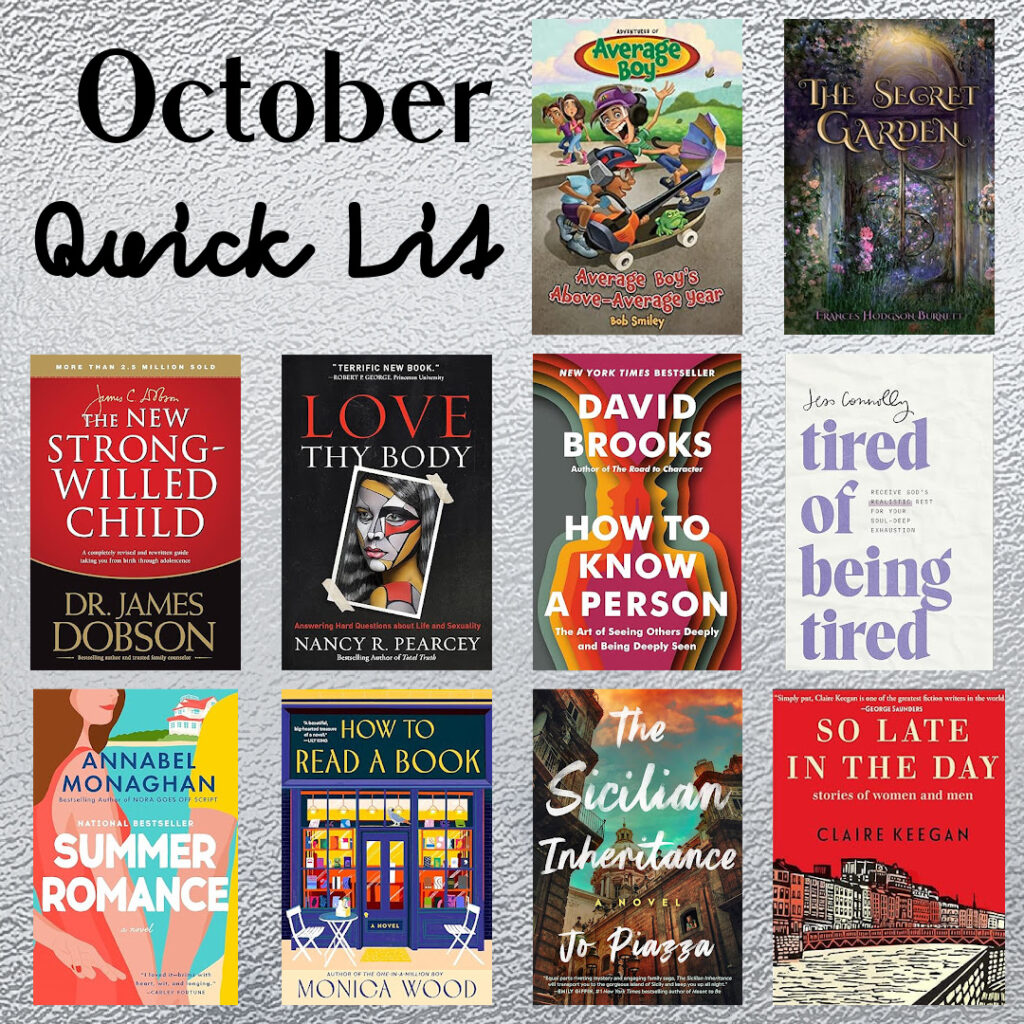
NONFICTION
How to Know a Person: The Art of Seeing Others Deeply and Being Deeply Seen, by David C. Brooks: As an opinion writer and commentator, David Brooks knows a thing or two about observing other humans. And as Brooks himself states, “There is one skill that lies at the heart of any healthy person, family, school, community organization, or society: the ability to see someone else deeply and make them feel seen—to accurately know another person, to let them feel valued, heard, and understood.” Unfortunately this is a skill few of us have mastered, leaving most of us—and those all around us—feeling unseen, unheard, and misunderstood.
In this highly useful guide, Brooks educates us on the skills of TRULY knowing someone else, from asking the right questions and expressing empathy, to recognizing people’s sufferings, understanding their history, and being willing to engage in the hard conversations. Brooks relies on personal anecdotes and the stories of others to illustrate these principles and demonstrate his own growth in understanding and seeing others.
Seeing others is an area I would love grow in, and Brooks has set me up for success through the pages of this book that is engaging and actionable. Some principles were familiar, but I appreciated their presentation and suggestions for applying them to my own relationships. A few key takeaways: resist the temptation to relate others’ experiences to my own; don’t try to fix others’ problems, simply offer support (the chapter on supporting someone experiencing depression was phenomenal); understand that everyone reacts to circumstances and events differently; know how the Big Five personality traits factor into relationships; and ask “how” and “why” questions over “what” questions.
Taken a chapter or two at a time, this would make a great book club selection.
My Rating: 4 Stars // Book Format: Audiobook
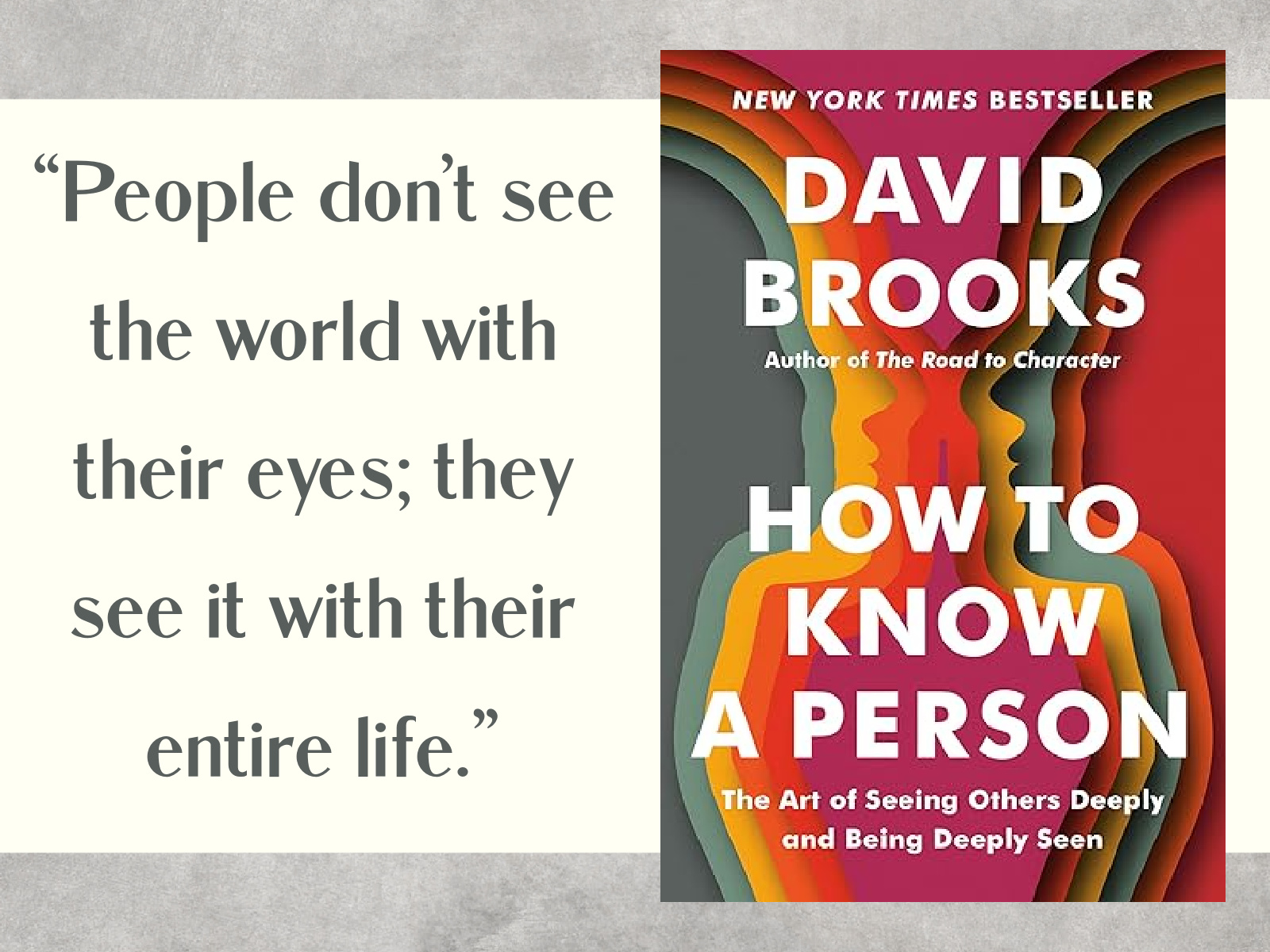
Tired of Being Tired: Receive God’s Realistic Rest for Your Soul-Deep Exhaustion, by Jess Connolly: I read a book about being tired just two weeks after bringing my fourth child home from the hospital. Coincidence? I think not! I’m one tired lady and this latest from a Christian author and teacher I trust seemed fitting for my current life stage. But it’s not just new moms who are exhausted; many women of every life stage face burnout and fatigue. We know of God’s promises of rest and abundance, but our haze of exhaustion can make it hard to believe these promises for ourselves.
Through personal stories and Biblical insight, Jess Connolly helps women identify the sources of our fatigue and the type(s) of rest we need—physical, emotional, mental, or spiritual. She then offers practical tips and practices for introducing rest into our lives in the areas we need it most. Throughout the book, she reminds us that tiredness does not need to be our default state and (graciously) offers permission to rest in ways that feel not just enticing but totally doable.
The concept of different types of rest was not new to me, as I was first introduced to this concept through Saundra Dalton-Smith’s book Sacred Rest (a 5-star read for me). But I appreciated the chance to revisit the subject of rest in its various forms, and I had some good takeaways from this book. I particularly loved Connolly’s thoughts on changing the cultural conversations around rest and fatigue, which involves letting go of busyness as a badge of honor. And I appreciated the author’s honesty about her own struggles to rest and her slow-but-steady approach to finding new rhythms. The reflection questions and recommended verses for mediation at the end of each section are also fantastic.
My Rating: 4 Stars // Book Format: Audiobook

The New Strong-Willed Child, by James C. Dobson: Every parent (or adult who has spent time with children) knows that each child is uniquely wired. Some children are compliant and eager to please, while others are more challenging. In this classic title (first published in 1974), Dr. James Dobson (founder of Focus on the Family) helps parents of the challenging (“strong-willed”) children navigate the struggles of dealing with particularly difficult behavior. Dobson begins by explaining the basics of childhood temperaments and the “why” behind strong-willed temperaments, helping parents understand that these children, while not easy to parent, are not abnormal and their behaviors can be managed. Dobson goes on to explain how parents can effectively shape a child’s will without damaging his or her spirit; how to establish and maintain healthy boundaries; how to modify parenting tactics by age and temperament; and when and how to utilize corporal punishment—which should be used very sparingly and implemented carefully and with love.
I was apprehensive about reading this book after hearing it and many of its principles disparaged by contemporary parenting experts, but after encouragement from my in-laws (who used this and Dobson’s other books to great effect when parenting Luke and his siblings), Luke and I both gave it a read and are glad that we did. Though none of our children would qualify as “strong-willed” as Dobson describes it, they do exhibit strong-willed tendencies and the suggested tools are actionable and effective (and applicable to all children, not just strong-willed ones). I especially appreciated Dobson’s deeply caveated section on spanking, which debunks many myths surrounding corporal punishment and makes a case for its use as a preventative measure against true child abuse (which can happen when parents allow their children’s behavior to elevate past the point of being managed).
This book won’t be for every family, but Dobson’s strong but compassionate tone and adherence to Biblical principles really resonated with me and with Luke. Some of the examples and cultural references are dated, even in this updated version (it had me pining for the days when MTV was parents’ biggest media concern), but the ideas are timeless. I enjoyed the audio narration from John Fuller, whose voice was familiar to me as he’s now the host of the Focus on the Family Daily Broadcast, but I also found it helpful to follow along in the Kindle version.
My Rating: 4 Stars // Book Format: Audiobook
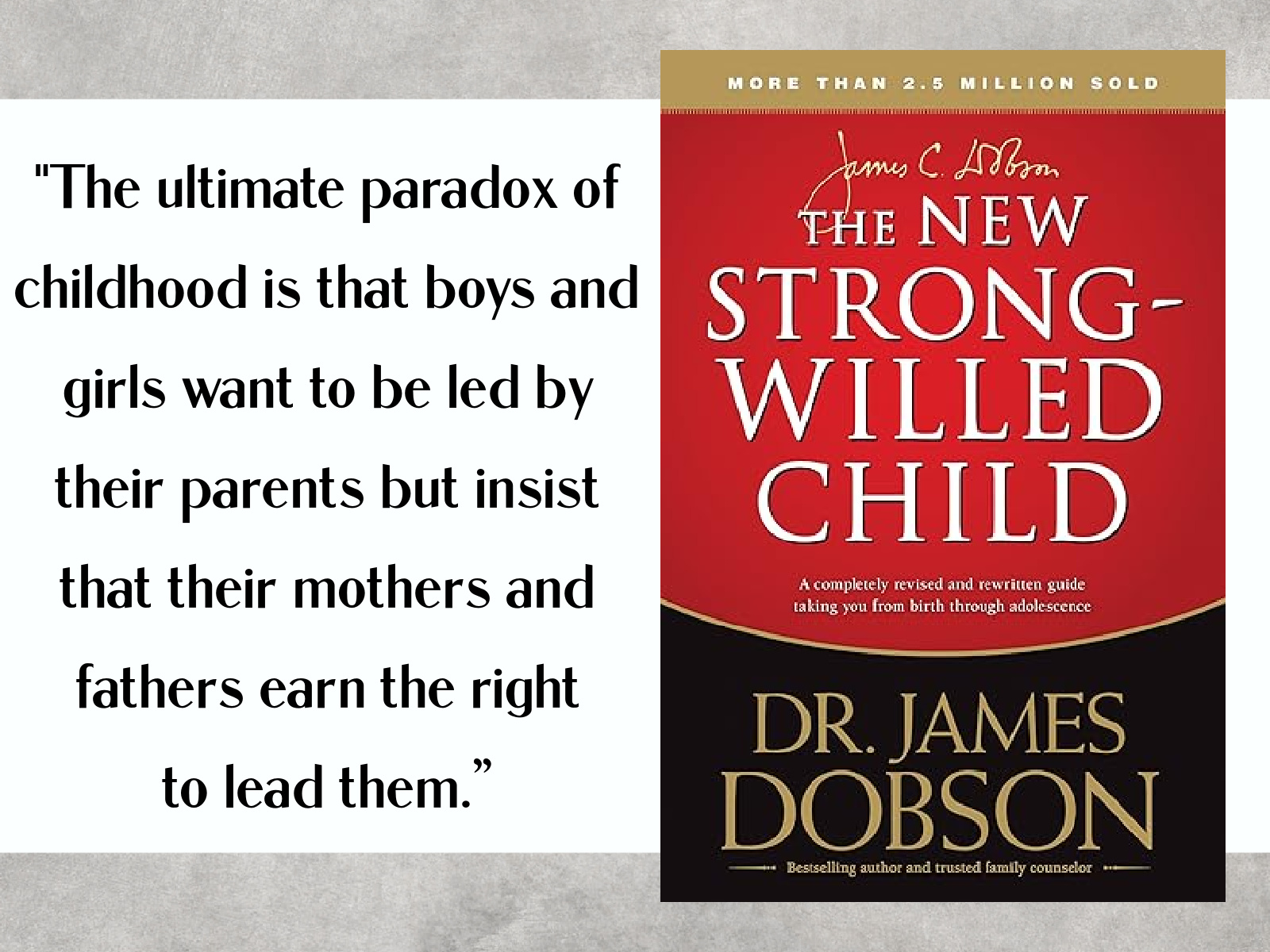
Love Thy Body: Answering Hard Questions about Life and Sexuality, by Nancy Pearcey: Issues of the body, identity, and sexuality are at the forefront of cultural conversations at the moment and, as such, have been at the forefront of my reading selections as I work to establish my own Biblically-sound understanding of these topics. Many of the books and podcasts I’ve explored have referenced this book from Christian journalist/researcher Nancy Pearcey (whose book on masculinity is also a must-read). Published in 2018—before the conversations on sexuality really exploded—Love Thy Body not only addresses the more “obvious” topics of homosexuality and transgenderism, but other aspects of the human body including abortion, hook up culture, and euthanasia.
Pearcey comes to these issues from a Biblical perspective, but also weaves philosophy and history into her arguments. She shows how misguided attitudes on all of these issues stem from a denigration of the human body and secular ideals that have abandoned objective truth and prioritize human emotion and self-determined values over rational thought. (As Pearcey writes, “The key to understanding all the controversial issues of our day is that the concept of the human being has been fragmented. . . Secular thought today assumes a body/person split, with the body defined in the ‘fact’ realm by empirical science and the person defined in the ‘values’ realm as the basis for rights. This dualism has created a fractured, fragmented view of the human being, in which the body is treated as separate from the authentic self.”) She then makes a case for a Biblical worldview which, contrary to popular belief, offers an elevated view of the body and sexuality and is MOST honoring of human design and well-being.
It’s difficult to communicate how much I appreciated this book that is now my top recommendation for books on these topics. Pearcey’s writing is clear, concise, and comprehensive. She does not stray from scriptural views while remaining compassionate in her approach; anecdotes incorporated into each chapter bring practical and human elements to the book. Her explanation of postmodern thought and other philosophical concepts adds an extra layer of clarity to her presentation, and her cultural and scientific additions lend credibility to her arguments.
I came away with a deeper appreciation for God’s design for sexuality—not just because it is morally right and true, but also because it is genuinely what is best for human flourishing. And I am so convicted by Pearcey’s message that “Christians must make it clear that they are speaking out because they genuinely care about people. No matter how compelling the case for a biblical ethic, people rarely change their minds based on intellectual arguments alone. They are even less likely to change if all they hear is moral condemnation. People must be drawn in by a vision that attracts them by offering a more appealing, more life-affirming worldview. Christians must present biblical morality in a way that reveals the beauty of the biblical view of the human person so that people actually want it to be true. And they must back up their words with actions that treat people with genuine dignity and worth.”
My Rating: 5 Stars // Book Format: Audiobook (Followed along on Kindle)
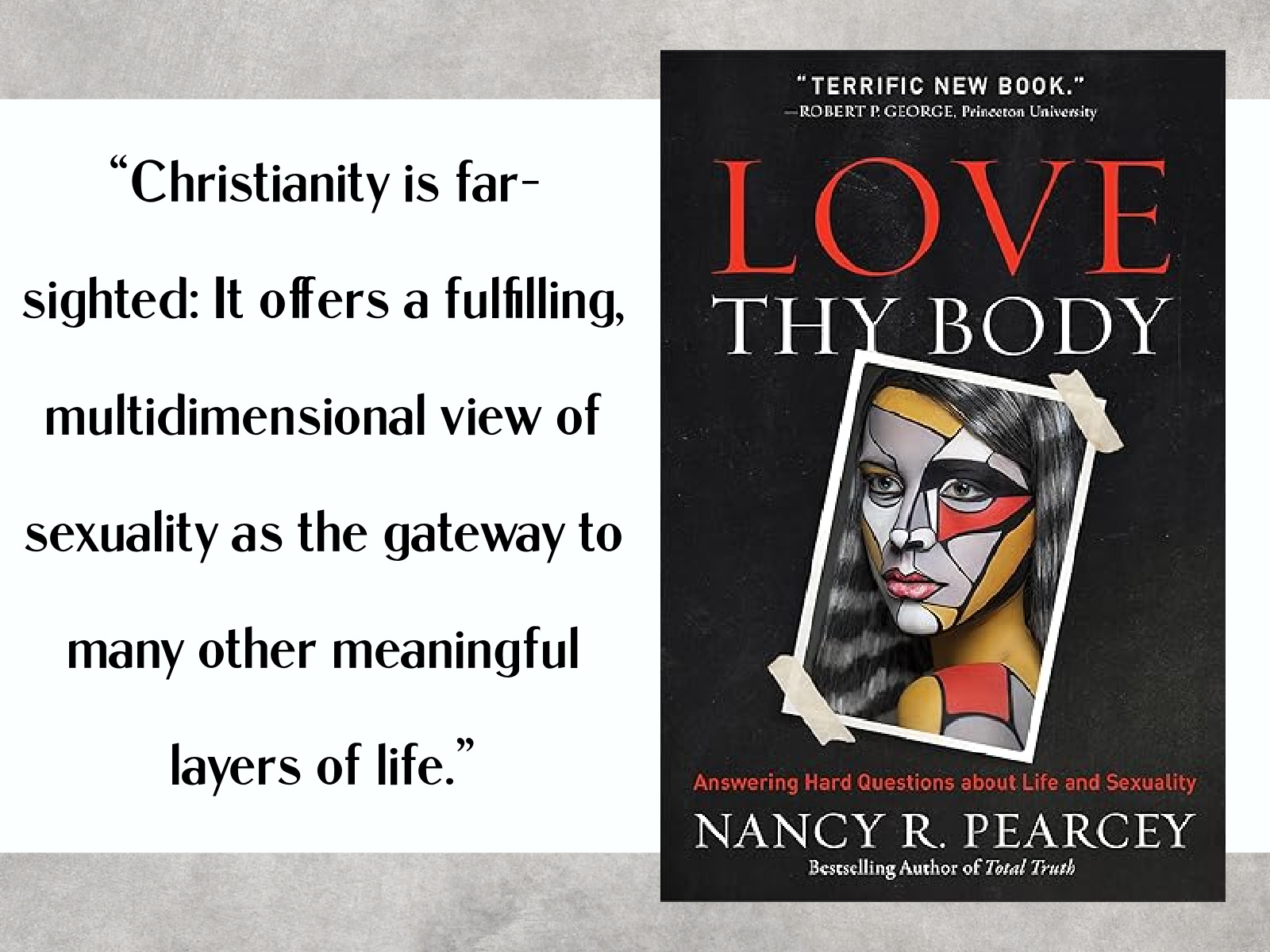
MIDDLE GRADE FICTION
The Secret Garden, by Frances Hodgson Burnett: Mary Lennox is a neglected and unhappy ten-year-old who has never known love or attention from her parents. So she is largely unaffected by their deaths beyond the changes that their passing brings to her circumstances, as she is forced to leave her home in British India to live with her reclusive uncle at Misselthwaite Manor on the Yorkshire Moors. There, this bitter, lonely child begins to come alive with the fresh English air, a collection of unlikely friends, and the discovery of a secret garden that awakens a long-dead sense of wonder. She is joined in her adventures by Dickon, the much-loved brother of Mary’s sprightly maid Martha, and her bedridden cousin whose temperament is even worse than Mary’s own. Together they discover the magical healing powers of nature, companionship, and an immutable spirit.
I grew up on the 1993 film production of this classic (it was one of my most-watched VHS tapes) and enjoyed reading the novel with a group of students during my teaching days. I was eager to introduce my own kids to the magic of the garden, and while they didn’t love this as much as some of our other read-alouds, we enjoyed sharing the story and discussing its themes of restoration, resilience, and the power of mindset. I enjoyed leaning into the Yorkshire accents for our read-aloud, and we are looking forward to following up our reading with a viewing of the film—the 1993 version and perhaps the 2020 version as well.
My Rating: 4 Stars // Charleston’s Rating: 4 Stars // Book Format: Print
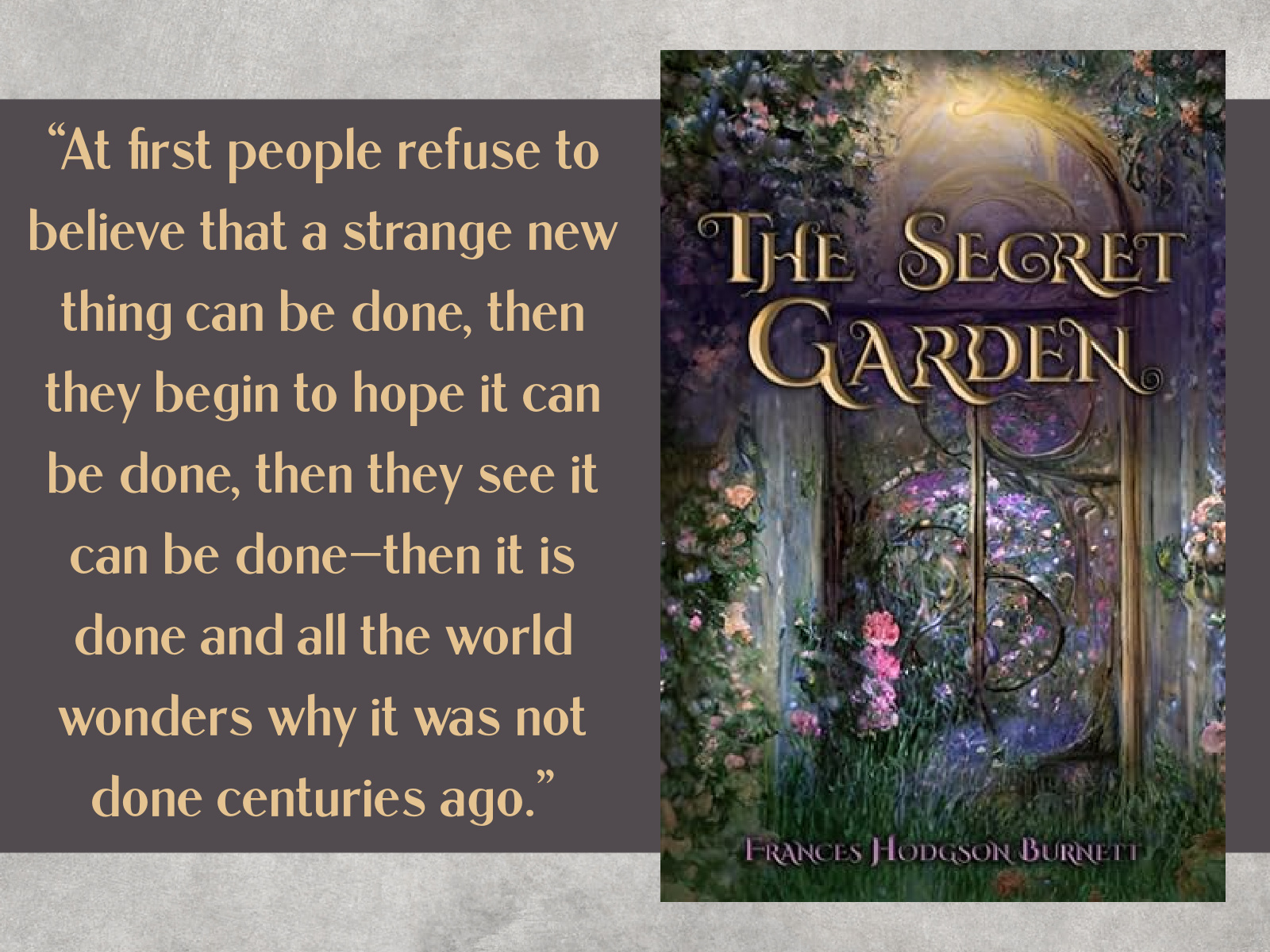
Average Boy’s Above-Average Year, by Bob Smiley: Bob is just your average Middle School boy—if by “average,” you mean (obliviously) unpopular, wise-cracking, and prone to hilarious escapades. Bob is determined to make his first year of Middle School a great one. . . or, at the very least, one that is above-average. Bob knows this year will bring its challenges, but he plans to face them head-on while also standing up for God in the process.
Charleston read this one before me and could not stop talking about it! After hearing him chuckle his way through the book, I happily conceded to his insistence that I read it for myself; and I can absolutely see why he loved it so much. The book reads like a 20-chapter stand-up comedy act with one joke after another. Some are cheesy, but most are clever and written at a level that can be appreciated by kids as well as their parents. I loved that this was totally clean humor; there is nothing crude or remotely inappropriate, and there ARE plenty of great Biblical lessons woven into each oddball story.
I’m always excited to find a series that is both kid-friendly and adult-approved, and this one totally fits that bill. Charleston plans to become a Bob Smiley completist and I’m happy to foot the bill for his current book obsession!
My Rating: 4 Stars // Charleston’s Rating: 5 Stars // Book Format: Print
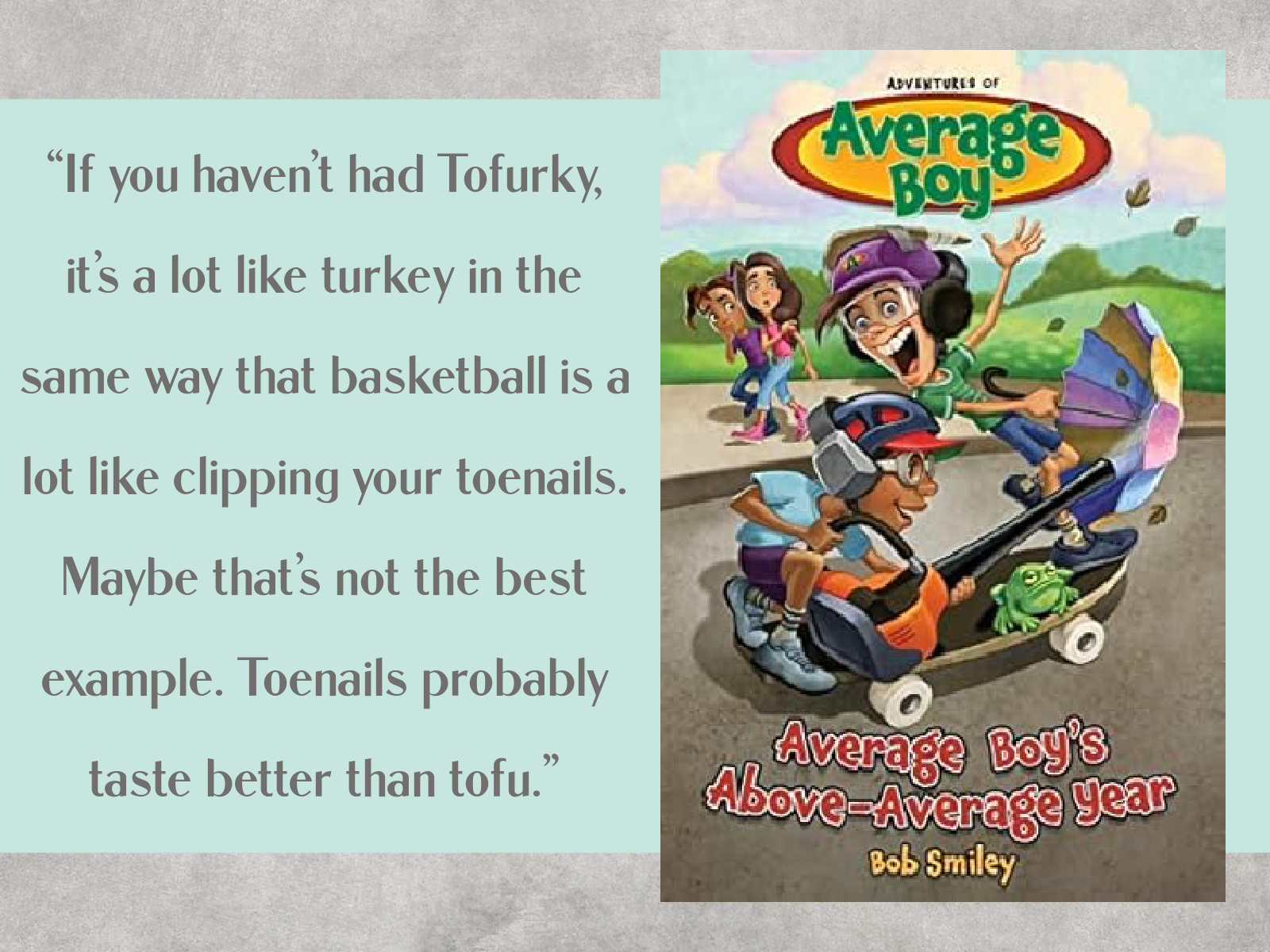
ADULT FICTION
So Late in the Day, Stories of Women and Men, by Claire Keegan: This trio of short stories from the author of Foster and Small Things Like These begins with “So Late in the Day” in which a middle-aged man mulls over his recently-ended relationship on what was meant to be his wedding day. In “The Long and Painful Death,” an author’s day of work at a writer’s retreat is disrupted by an intrusive houseguest. And in “Antarctica,” a married woman engages in an affair with an alluring stranger. Each story explores the dynamics between men and women, highlighting the ways in which failures of generosity, civility, and transparency can upend a moment or a day or a life.
Claire Keegan is a master of illuminating the immensities of humanity hidden within the crevices of our stories. While the novellas for which she is best known highlight human kindness and hope, these stories probe the opposite sides of the human experience. Though poignant, these stories are dark, gritty, and oppressively bleak. Though I appreciated these stories for their artistic merit, this was not a collection I enjoyed or would recommend.
My Rating: 3 Stars // Book Format: Kindle
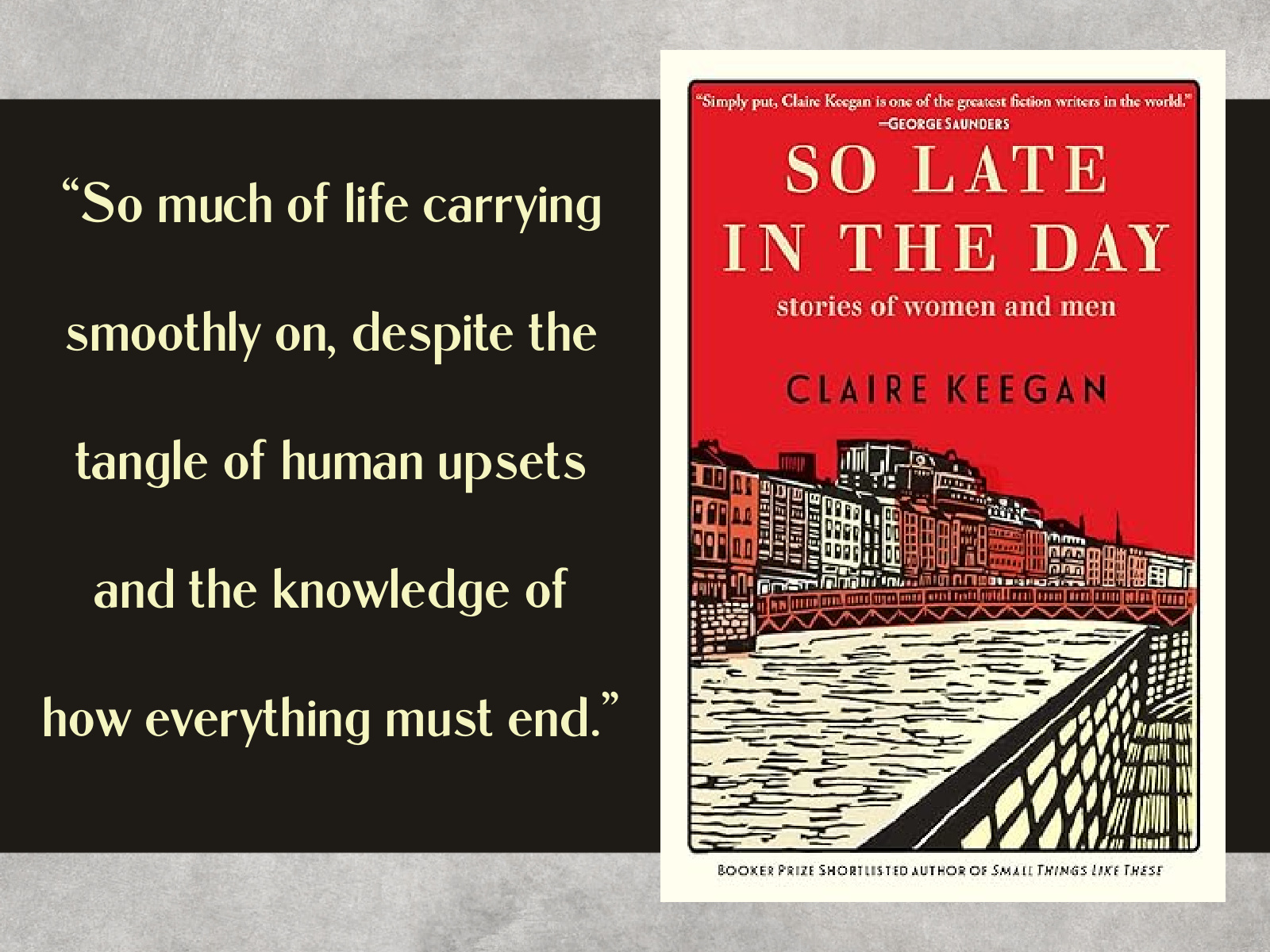
Summer Romance, by Annabel Monaghan: Ali Morris earns a living organizing other people’s homes, yet in a true instance of the “cobbler’s children having no shoes,” her own home and life are a mess—and have been since her mom (and best friend) died two years ago. Now, on the one-year anniversary of her husband Pete leaving Ali and their three kids, Pete has finally asked for a divorce and Ali musters the strength to don “real pants” for the first time in far too long. Her attempts at moving on are more successful than she had imagined when a trip to the dog park leads to a surprising meet-cute with the man of her dreams. Ethan is attractive, successful, and—most importantly —actually respects Ali in a way her husband never did. He’s also leaving town at the end of the summer, which gives them the summer for a quick romance that will bring Ali back to a former version of herself but could break her heart in the process.
I was cautious entering into this book after a lackluster experience with Same Time Next Summer (reviewed in my last Quick Lit post). Fortunately this was much more reminiscent of Nora Goes Off Script, but better! I found so much to love in this novel, from the enticing small town setting to well-drawn characters, emotional depth, and thoroughly explored themes of grief, parenthood (particularly parenting teens), and reconciling with one’s complicity in a past relationship gone wrong. I enjoyed seeing Ali’s growth throughout the book and especially loved the professional organizer aspect of the story (and the ways in which organization is portrayed as a form of self care, which is absolutely true for me).
I generally prefer more banter in a Romance, but what this book lacks in humor it makes up for in heart as well as believability and maturity. This is a true “grown up” love story, with all of its challenges and also its emotional resonance. And while I found Monaghan’s sentence-line prose to be somewhat plodding, this simplistic writing makes space for her psychological insights and commentary to shine.
This book is fairly tame on the spicy scale: there is definitely some steam, but the intimacy mostly takes off the page.
My Rating: 4.5 Stars (Rounded to 5 stars on Goodreads) // Book Format: Kindle
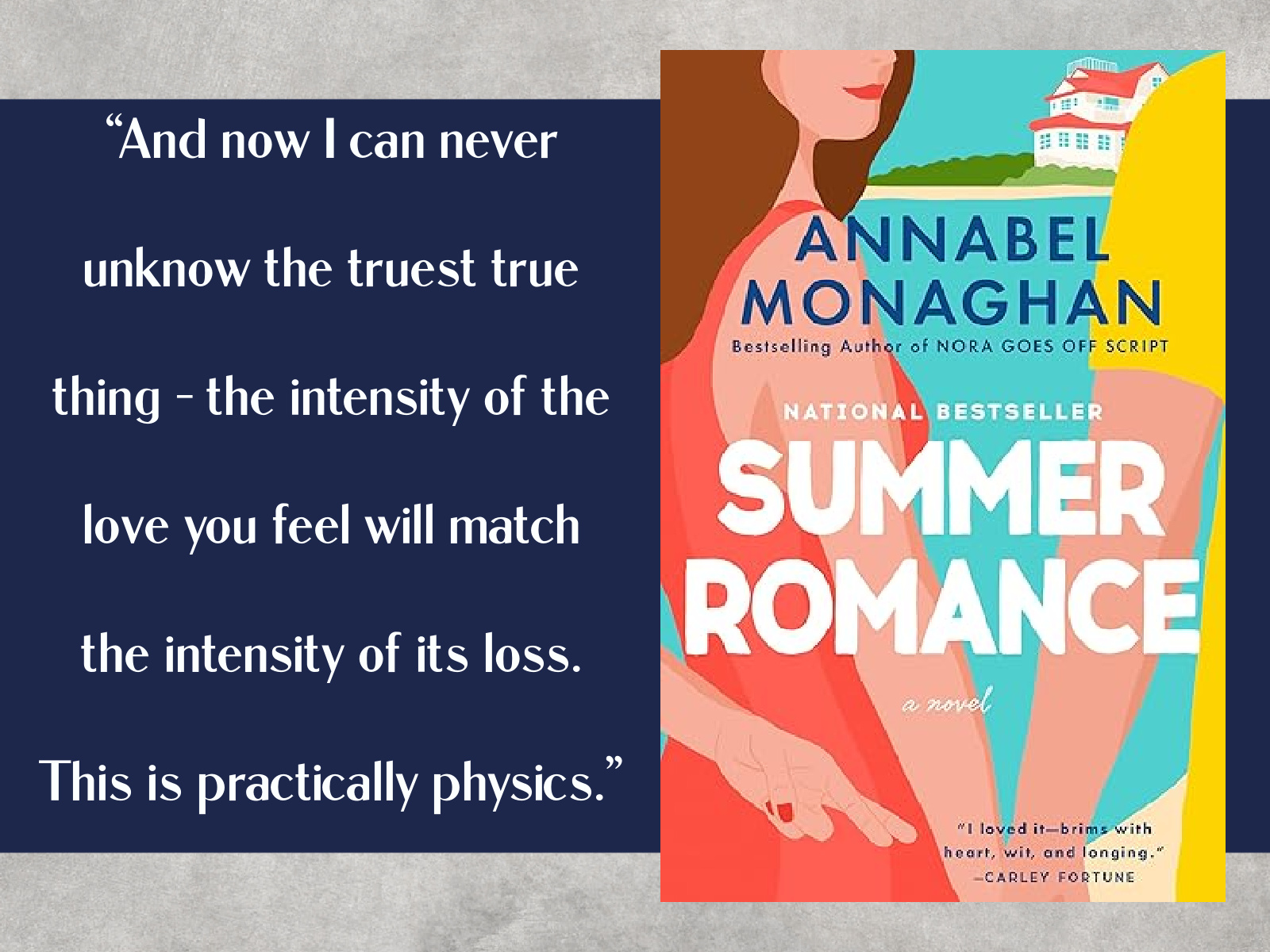
The Sicilian Inheritance, by Jo Piazza: Sara Marsala once believed she could have it all, and for a time she did: a happy marriage, a successful career as a butcher and restaurant owner, an adorable daughter. But when her business and marriage fail, she is overcome with grief that is compounded by the recent passing of her beloved great-aunt, Rosie. Sara escapes the shambles of her life to fulfill Aunt Rosie’s dying wish that Sara travel to Sicily to scatter Rosie’s ashes and also investigate the family claim to what may be a valuable plot of land.
While in Sicily, Sara uncovers secrets about Rosie’s mother, Serafina, who was left behind when her husband and children traveled to America. According to family lore, Serafina was a faithful wife and near-saint who died of illness before she could make the trans-Atlantic journey with her family. But stories told about Serafina in her home village are much different, and Sara must come to terms with this new narrative that paints Serafina as a witch, an adulteress, and the victim of murder. Sara’s present-day investigation of her grandmother’s death alternates with Serafina’s narration from her life in Sicily in 1920s, and together the two women’s stories paint a portrait of female oppression and, ultimately, empowerment, a century and a continent apart.
I found much to appreciate in this novel, from the genre mashup (that blends historical fiction with mystery, romance, and family drama) to the Sicilian setting (I knew nothing about Sicily—especially not the fact of its birthplace to the mafia—prior to reading) and compelling protagonists (I’ve never read a novel about a female butcher or a village medicine woman). It took some time to get into the story, but I love how the mystery came together in the final chapters. I also found the subtle mother/daughter themes quite touching.
There were other parts of this novel that were not to my taste. While I enjoyed the historical storyline, the present-day one was less engaging and at times quite cheesy with its overdrawn side characters, an insufferable protagonist, and contrived suspense. There is a heavy feminist theme that runs throughout the novel, and while I enjoyed reading about women supporting one another and learning to embrace their unconventional gifts, the anti-patriarchy/female empowerment agenda was at times too heavy-handed for my taste.
Overall, while this is not a perfect book, it was certainly an engaging and ultimately worthwhile read. Don’t miss the Author’s Note at the end, in which Piazza explains how her own Sicilian great-grandmother was the inspiration for the character of Serafina.
My Rating: 4 Stars // Book Format: Kindle
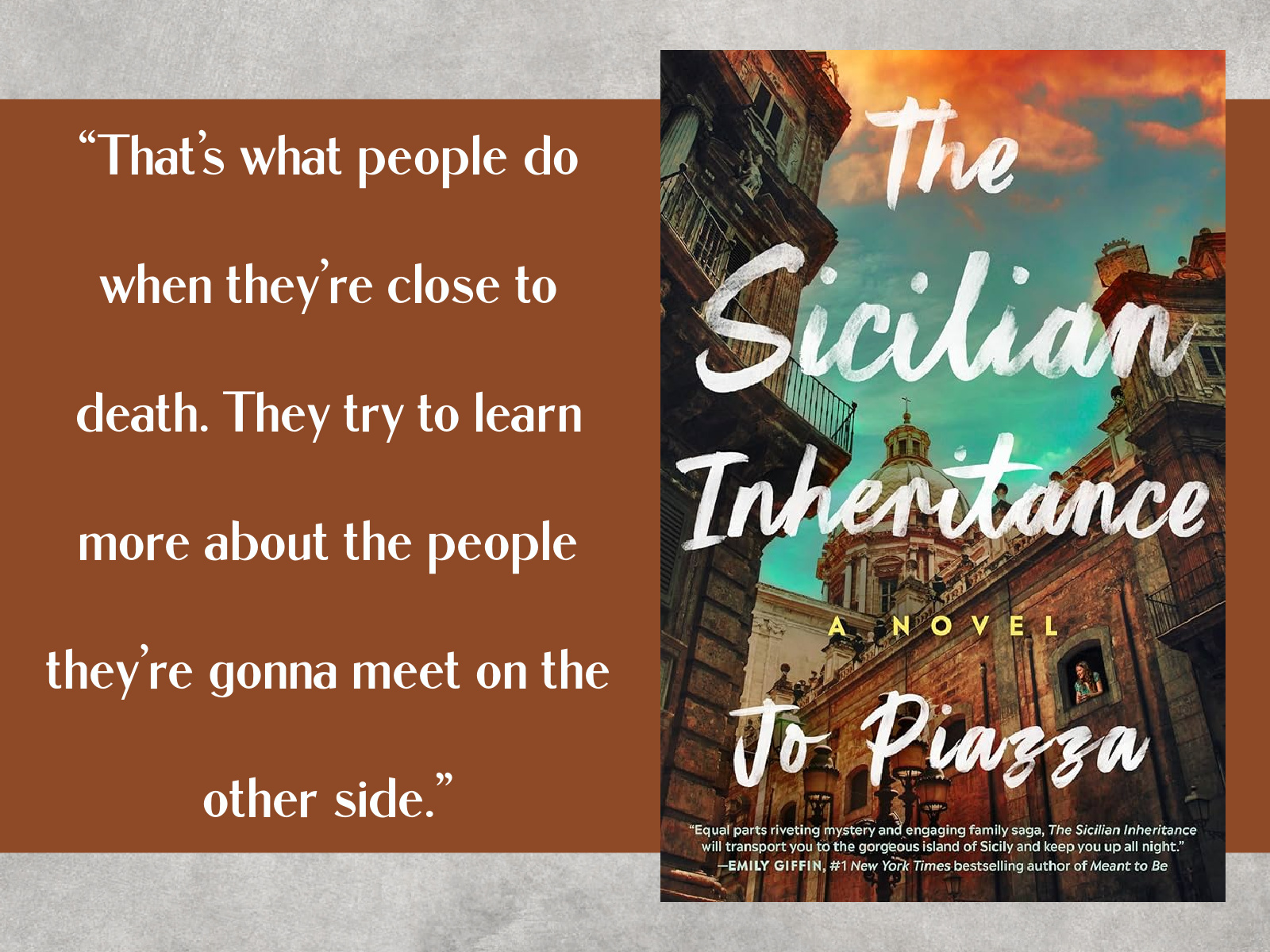
How to Read a Book, by Monica Wood: Twenty-two-year-old Violet Powell spent the last two years in a Maine prison, where she served time for a drunk-driving crash that resulted in the death of a sixty-one-year-old Kindergarten teacher. Now she’s on her own in Portland, Maine—friendless, lacking purpose, and grief-stricken over the ostracization from her former life. When Violet wanders into a local book store to purchase a copy of the novel she was reading for her her prison book club prior to her release, she has two shocking encounters: the first with Harriet, the retired English Teacher who led her prison book club, and the second with Frank, a retired machinist whose deceased wife was the victim of Violet’s crime.
Before long, the lives of Frank, Harriet, and Violet are intertwined as together they make peace with past transgressions and forge new identities built on mercy, hard-earned wisdom, hope, and the sweetest lessons literature can teach them.
This is an unexpected and beautiful story that wormed its way into my heart and worked its magic in a span of two weeks when I—like Violet, but for entirely different reasons—was struggling to find my footing (as a new mom to four). Monica Wood mesmerized me with her flawed-yet-lovely characters, her lessons of kindness and redemption, her clear-eyed observations, and her richly layered prose. I especially enjoyed the book club passages and the ways that Harriet and her club of female inmates find meaning and connection through books; the ways that one particular book club selection plays into the overall structure of THIS novel (as revealed in the breathtaking epilogue) is surprising and beautiful. The inclusion of other niche subjects, including machine-making and the study of talking parrots (really), is also creative and gives this book that extra something that was unnecessary but delightful.
This would easily have been a 5-star read if not for a particular story thread involving (cheesy and grossly inappropriate) infidelity that knocked this down half a star for me. I still expect this will land a spot in my favorite books of the year, and the way this book caused me to reflect on the big and small stories of my own life will stick with me for a long time. Perfect for fans of A Man Called Ove and Remarkably Bright Creatures.
My Rating: 4.5 Stars (Rounded to 5 Stars on Goodreads)
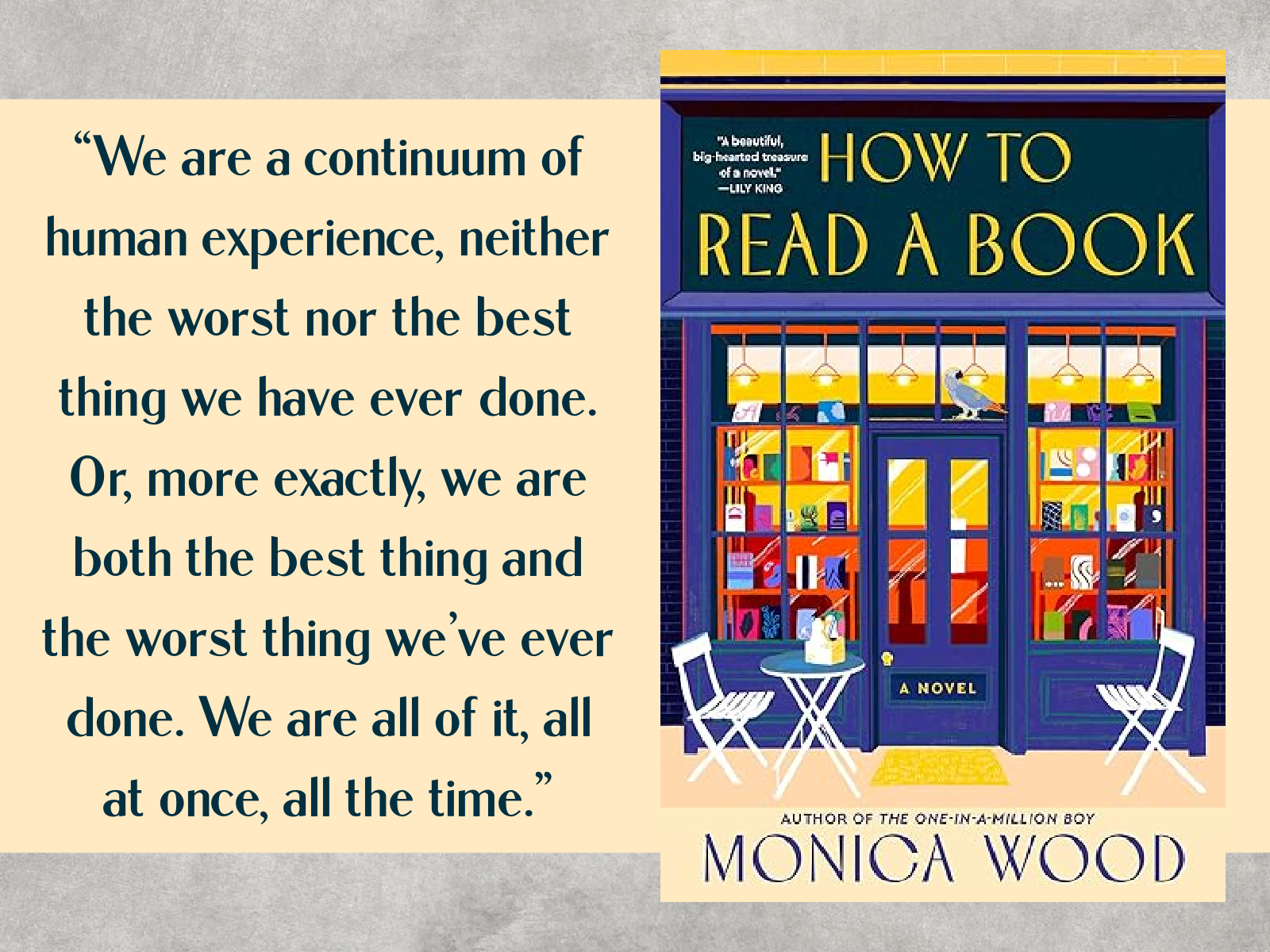
Have you read any of these titles? I’d love to hear your thoughts, share with me in the Comments!